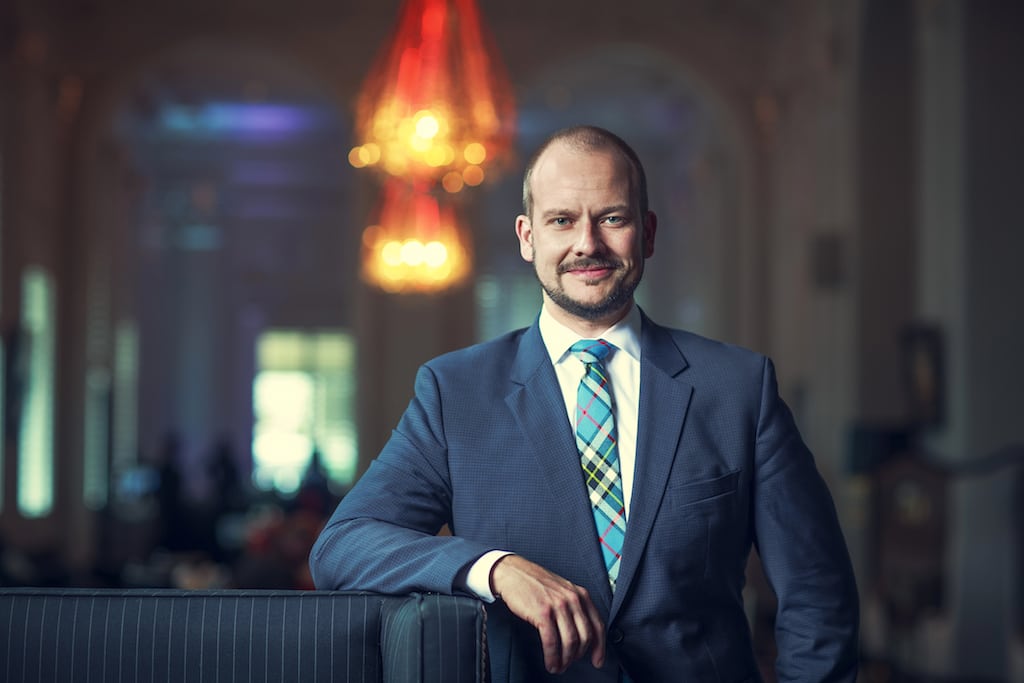Skift Take
As global hotel companies divest their physical assets and evolve into lifestyle brand-building machines, hospitality schools haven't adapted, and there's a big talent gap because of it.
Unlike in Europe and Asia where an executive career in hospitality enjoys a heightened stature, hotel careers in North America have traditionally been viewed as an occupation, not a profession.
In fact, for many people employed today in U.S. hotels, even at the highest levels, it’s often an “accidental occupation” according to Gray Shealy, executive director of the new Master’s of Hospitality Management program at Georgetown University in Washington, D.C.
In the past, many hotel executives in North America initially began working in hotels as a way to make money in school on their way to careers in other sectors. But then they became enamored with the lifestyle and worked their way up the ladder over time, evolving into executive positions in corporate hotel offices almost by accident.
Today, that career trajectory is much less common. In the global hospitality industry in 2015, where hotel companies no longer own the majority of their room inventory, the executive marketplace prioritizes branding and marketing expertise as much as operational knowledge and management skills. The age-old story of the bellboy working himself up to company president over a span of 40 years is now just the stuff of hotel lore.
However, according to Shealy, hospitality education has been slow to evolve with the times, and many graduate schools are teaching coursework that’s not entirely relevant to the industry today.
Previous to his hiring in January 2014 and the launch of the graduate hospitality program last fall, Shealy was the global design director for W Hotels. He says Georgetown was specifically searching for someone with extensive corporate hotel experience outside of academia to develop the course curriculum and run the program, in an effort to avoid duplicating what other hospitality schools are doing.
Shealy, who has a degree in architecture, extensively explored other hospitality schools in North America and abroad to understand the nuances of their programs, and more importantly, their practical relevance in the real world of international hospitality in the 21st century. He says most other graduate hotel schools with Master’s of Science programs focus mainly on theory, whereas Georgetown’s core mission and applied approach is developing hotel executives who actually want to work in the hotel industry.
“Hospitality education hasn’t always typically been a top priority on CVs when hiring for hospitality positions,” explains Shealy. “At many of the big schools in hospitality, their graduate programs are more focused on research, ultimately training students to go into a doctoral program, and preparing them to become professors, and less about educating people to go into the workforce.”
The Rise of the Non-Hotel Hotelier
When Frits van Paasschen was hired as CEO of Starwood Hotels in September 1997, with no previous experience in hotels, it marked a turning point in hotel executive development. Van Paasschen came from the C-suite offices of Nike and Coors where globally differentiated lifestyle branding and sophisticated marketing had been raised to an art form, but he didn’t know RevPar from rebar.
As hotel companies at the time were shedding their equity stakes in physical hotel assets, they were freed up with flush cash to develop more hotels and more hotel brands. Delineating those brands well in a crowded market became paramount, and no company has done that as deftly as Starwood since then. By the end of the 1990s, suddenly running and operating a hotel company wasn’t about running and operating hotels. It was about brand building.
“Delivering meaningful, personalized branded experiences for our guests is what we’re about,” is how van Paasschen explained it in 2013 during the annual Starwood Rendezvous buyer/supplier gathering in New Orleans.
“So now you have Starwood being run by a bunch of Nike execs who came from branding, who came from retail, who came from marketing, and who really signify that company’s focus,” says Shealy. “With this type of approach at Starwood, and many other companies, that changes the game for everybody. And even though the industry has been quite slow to accept that, we’re seeing how people interested in executive positions need to differentiate themselves in the industry in different ways, other than the traditional, experience-based CV.
To answer that demand, Georgetown’s graduate hospitality program is taught by adjunct professors who are currently employed in the hospitality sector, as opposed to tenured professors who sometimes have never worked in a hotel. The adjuncts are bringing real world experience into the classroom, who can explain the context around any of the class materials as they apply to the industry today.
Another benefit of having working hospitality pros teaching graduate level curriculum revolves around the importance of making connections in the hospitality business. The thinking is that students today have an advantage when they can meet as many influential tourism and hospitality professionals as possible, and in Washington, D.C., there are a lot.
Both Marriott International and Hilton Worldwide are based in and around the nation’s capital, as well as the U.S. Travel Association and Destination Marketing Association International, among many others.
“So I see the classroom as not only a way to learn about the foundations of hospitality, and the academic theories of hospitality, but also learn from the people who have done it for many years, and learn how they run the business of hospitality,” says Shealy. “At the same time, it’s also about meeting significant players in the industry because at the end of the day, hospitality is largely about who you know. So the university is also looking at itself as a business model, and not only an academic model, which I think is quite different.”
The Next Generation Classroom
The course curriculum for Georgetown’s Master’s of Hospitality Management program consists of core classes and four executive tracks focused on Brand Management & Guest Experience Design; Development & Asset Management; Global, Regional & Local Practices; or a customized combination of all three for students aspiring to be innovators in the industry.
Most importantly, the coursework is designed to tackle major industry disruptors trending today, including Airbnb and online travel agencies (OTAs), as well as more subjective skills that hotel executives need to thrive in high-powered corporate settings.
“In general, something really left out in traditional hospitality education is leadership, because the notion of how to navigate through a corporate environment and advance has largely been left out of the classroom,” says Shealy. “So we teach things like how to network, or conduct yourself in a meeting with people from different cultural backgrounds, and understand their decision making process. Or how do you become a great speaker, or deliver an elevator pitch to a CEO in 30 seconds? These sound basic but I think they are very cloudy waters for people entering the industry.”
Although, all of that pales to a certain degree in comparison with the business drivers shifting the hospitality landscape. Shealy suggests that it’s critical for his graduating students to come out of school with the ability to speak authoritatively about the brand-building machinery underpinning the global hospitality industry of today.
“One of our primary educational thrusts is largely about building brands and selling brands, and the value of marketing and branding in terms of customer loyalty,” he says. “Because the Marriotts and Starwoods of today are basically turning into giant loyalty programs.”
Greg Oates covers hospitality and tourism development. Email him at [email protected].
Have a confidential tip for Skift? Get in touch
Tags: hospitality schools, state of travel education
Photo credit: Gray Shealy was global design director of W Hotels before taking over the reins of Georgetown University's new graduate hospitality program. Gray Shealy

